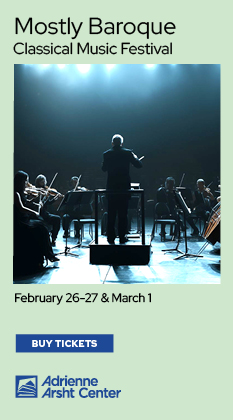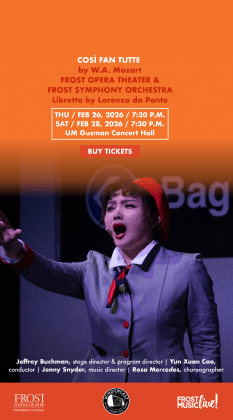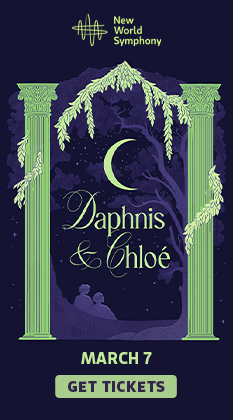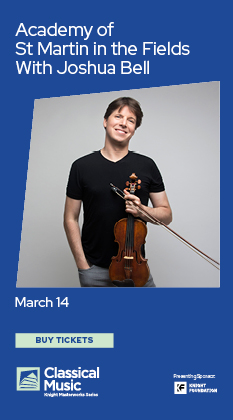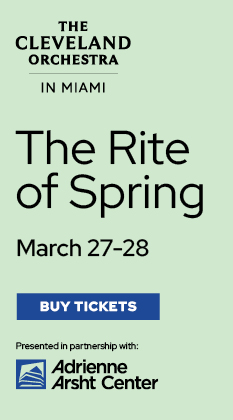FGO serves up a delightful evening with Puccini-plus comic double bill
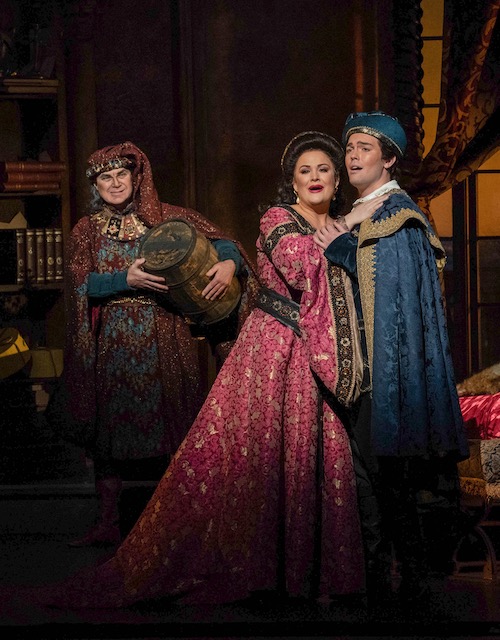
Page Michels and Charles Calotta with Franco Pomponi in background in Michael Ching’s Buoso’s Ghost at Florida Grand Opera. Photo: FGO
Operatic comedy is serious business to get right.
Saturday night’s opening of Florida Grand Opera’s double bill of Puccini’s Gianni Schicchi and composer Michael Ching’s sequel Buoso’s Ghost at the Arsht Center proved that point. With adroit staging, terrific singing from top to bottom by a large cast and an eye-filling production, this pairing is both potent theater and delightful entertainment.
From the evening of its premiere at the Metropolitan Opera in 1918, Gianni Schicchi has always been the hit of Puccini’s three-opera Il Trittico. Based on a thirteenth-century character from Dante’s Inferno, the opera is a tale of the avaricious Donati family who find out that the dead Buoso Donati has left all his money and property to the church. Eventually the clever lawyer Gianni Schicchi is brought in to pose as the dying Buoso, void the will and dictate a new one. The sly Schicchi, posing as Donati, leaves the best holdings to himself. His newfound wealth allows his daughter Lauretta to marry Rinuccio, a Donati relative, who she is deeply in love with. In a curtain speech, Schicchi pleads the lovers’ happiness as extenuating circumstances.
Composer Ching, who wrote his own libretto for the sequel, picks up the story with Schicchi discovering that Buoso was poisoned. Attempting to seek revenge and reclaim the money and property, the Donati clan accuse him of the murder. When that fails, they plot to kill him but Schicchi, once again, outsmarts them by impersonating Buoso’s ghost, causing the Donatis to flee in horror. He apologizes to the audience for a “novice composer” attempting a sequel to the work of the giant Puccini but, again, suggests extenuating circumstances.
Puccini’s score is not lacking in the composer’s trademark lyricism with the hit soprano aria “O mio babbino caro,” a fine tenor solo and a soaring duet for the lovers Lauretta and Rinuccio. But the fifty-five minute opera is distinguished by quicksilver lightness and rapid patter in the manner of Verdi’s Falstaff that make it unique in Puccini’s output.
For his part, Ching has crafted an epilogue to the Puccini original that brims with ingenuity and wit. Ching believes that opera should be fun for audiences. With wry quotations from Puccini and composers across the centuries, his modern opera buffa is that and more.
As the quick witted, scheming Schicchi, Franco Pomponi dominated the stage. His well-honed baritone can caress a phrase one minute, boom through the house in mock rage the next and spin patter with the pace and style of a Gilbert and Sullivan comic. This Schicchi was a formidable, larger-than-life force who was not to be outmaneuvered.
Charles Calotta soared in Rinuccio’s ode to the city of Florence in a lyric tenor both strong and sweet. Page Michels made Lauretta an independent-minded ingenue with considerable power over her father and a large, darkly colored soprano to match. Michels and Calotta’s voices blended wonderfully in ardent duets.
Robynne Redmon was a haughty Zita, her mellow mezzo sonority masking connivance, but her final comedic love scene with Schicchi (in Ching’s opera) suggested a softer side. Ashley Shalna as Nella and Erin Alford as La Ciesca brought beauty of timbre and vibrant stage personalities to the devious Donati relatives. Their shimmering trios with Redmon radiated faux concern. Anthony Reed as Simone and Philip Lopez as Betto cut commanding figures, their utterances delivered in vibrant bass tones.
Matthew Cossack’s notary and magistrate radiated pompous authority. José Vasquez and Daniel Bates as priests eager to collect Buoso’s money turned cameos into highlights, their fawned devoutness and serious declamation providing hilarity. Ismael Gonzalez, Joseph McBrayer and Eleomar Cuello adorned the smooth ensemble singing that is vital to both operas. Gabriella Molina was the child Gherardino, properly befuddled at the family’s behavior.
Ching conducted both Puccini’s classic and his own score with a light touch. His skillful balancing allowed the English text of Buoso’s Ghost to be heard clearly, aided by the cast’s excellent enunciation. Ensemble scenes were well coordinated, orchestra and singers never diverging on separate paths.
Mo Zhou’s deft staging brought out the twin bill’s fun. The opening scene, as the Buoso relatives scavenge the house and turn it upside down to find the will between fake tears, drew much laughter from the audience. A few details of timing and action that did not totally gel the first night should come together in subsequent performances.
Eric Renschler’s handsome Florentine villa setting (from Chautauqua Opera) and Howard Tsvi Kaplan’s multicolored costumes (with hues that perfectly matched the set) created atmospheric tableaux. Mary Ellen Stebbins’ lighting vitally enhanced the production design. Her dark, shadowy images for the ghost’s supposed appearances seemed right out of a Bela Lugosi horror film.
For seasoned opera lovers, this FGO double bill is a reminder that opera can bring a smile to the face as well as excitement to the senses. For operatic neophytes, the production makes a perfect introduction to the art form. There are four remaining performances in Miami and Fort Lauderdale.
Florida Grand Opera repeats Gianni Schicchi and Buoso’s Ghost 2 p.m. Sunday and 8 p.m. Tuesday at the Arsht Center in Miami and 7:30 p.m. February 9 and 11 at the Broward Center in Fort Lauderdale. fgo.org
Posted in Uncategorized
Leave a Comment
Sun Jan 29, 2023
at 1:33 pm
No Comments
